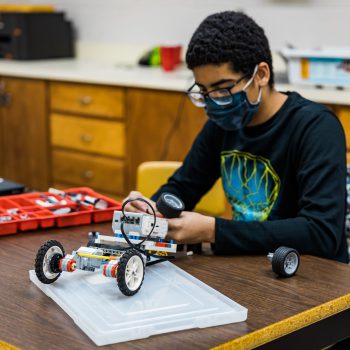
College and career readiness seems to be a daunting task until you watch the ingenuity of a CMCSS teacher. Classrooms across the district implement a mix of traditional learning and foundational concepts for the future. Eight-year-olds are exploring future-focused food sources, including hydroponic gardening. Middle school students are developing skills for computer coding. “Real-world skills have changed,” said Anne Stritzel, a sixth-grade science teacher at Richview Middle.
CMCSS teachers look for additional ways to provide next-level resources in their classrooms. Recently, multiple teachers were awarded grants from the TVA, Clarksville-Montgomery County Education Foundation, and Google Data Center. These funds allow the teachers and the schools to purchase additional equipment, emphasizing building career readiness skills.
Brynne Thompson, a third-grade teacher at Sango Elementary, was awarded two separate grants. First, she applied for a grant through the TVA, focusing on energy. Mrs. Thompson chose hydroponic gardens. “I want Sango to use it not just for science. This is supply and demand. Cause and effect. There are so many aspects for every grade level,” she said.
With the grant funds, the school should be able to purchase two hydroponic gardens for the main foyer. As the school’s STEM club advisor, Mrs. Thompson and her club will maintain the gardens, but all students will have the opportunity to participate. Each grade level will use the gardens throughout the year for different concepts related to their curriculum. Tennessee Urban Farms will come to the school in the spring and show students basic farming and gardening skills.
She is excited about the prospects the gardens will bring. Through sustainability and accessibility conversations, students will be learning about food sources, supply chains, and more.

In addition to the TVA grant, the CMC Education Foundation awarded a Big Idea Grant to Mrs. Thompson to purchase Dash Robots. The robots use block-based coding and encourage self-guided exploration of robotics and code-based technologies. She plans to introduce her students to careers and opportunities for coding. For elementary school, it’s all about taking big ideas and making them attainable.
Students at Richview Middle School have already been exploring the world of coding through the Technology class and the afterschool Robotics Club. With the new TVA grant’s robots, more students can have hands-on experience with drag and drop coding based on Scratch programming. The grant will provide 11 additional Spike Prime kits. For the school, this is a huge opportunity. “We will be able to have not only more kids in our after-school program, but that’s a whole class,” said Christina Ploeckelman, seventh-grade science teacher and one of the Robotics Club advisors. A three-person team can use each robot.
“This is the same type of code they would use in the future,” said Ms. Stritzel. “It’s allowing students to understand across platforms.” The current robots are over 10-years-old and the platforms on which they run are no longer supported. The Spike Prime kits provide consistency across the classroom and more student connections.
“Their interface supports problem-solving better,” said Ms. Stritzel. “It helps them learn fundamentals faster while using the engineering design process.” Now, the teachers can create a curriculum around the Spike Prime robots for their related-arts classes and bring more students into the world of coding. The teachers are thrilled to open up the opportunities to more than their Robotics Club. “It is very much group-oriented and student-driven. In the curriculum, we provide how to start. Then the students figure out what to change, how to modify, and develop a design.”
As the students moved through the room, the experience was filled with problem-solving and complex solutions. One team grew frustrated as their code did not elicit the intended result. The setbacks did not stop them, as they went back several times to collaborate, correct, and try again. In the robotics and technology classes, students learn how to face challenges head-on.
Ms. Stritzel added, “The skills they learn here are ever-evolving. So even if something changes, they have the foundation.”

At Burt Elementary School, these foundational skills will begin through a brand new set of manipulatives purchased through a Google grant from the local data center. In partnership with the CMC Education Foundation, the grant provided classroom equipment and a guest speaker, Mr. Science. Students and their families watched Mr. Science perform interactive STEM-related experiments with concepts they learned in the classroom.
Burt Elementary teachers will incorporate a variety of recently purchased items into their lessons. From soil testing kits, renewable energy kits, chemistry sets, and more, the students will explore science through hands-on learning. Through the lessons, teachers will introduce students to STEM careers. Many of the activities can be recreated at home, allowing students to share what they learned in school with their families.
“I tell my students every day, ‘You can do hard things.’ STEM allows students to think outside the box,” said Ms. Thompson. All of the teachers shared a similar sentiment of pride as their students grow in self-confidence. At all grade levels, the students are given the ability to work through complex problems. Critical thinking and problem-solving are foundational elements for future success.
“They are learning all of those 21st-century skills,” said Mrs. Ploeckelman. “We want them to see what they are learning in the classroom translates to careers.”


